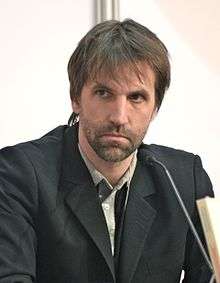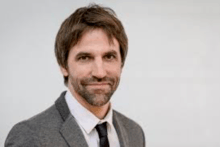Steven Guilbeault
Steven Guilbeault, born on June 9, 1970 in La Tuque, Quebec, is a Canadian environmentalist, speaker and writer. A founding member of Équiterre, Quebec’s leading environmental organization, he had a ten-year stint as director and campaign manager for Greenpeace Canada’s Quebec chapter. He currently serves as Senior Director and spokesperson for Équiterre.
| Steven Guilbeault | |
|---|---|
 | |
| Born |
1970 (age 47–48) La Tuque, Quebec |
| Occupation | Activist, columnist, consultant |
| Years active | 1994–present |
| Known for | Greenpeace, Équiterre |
Biography
Education and Activism
At five years of age in his hometown of La Tuque in Haute-Mauricie, Steven Guilbeault refused to get down from a tree that he had climbed, in an effort to block a land developer from clearing a wooded area behind his home. The tree was felled a few days later, but the event stands as a public debut of sorts for Steven Guilbeault, who cites it as the genesis of his environmental activism. It was the first time that he stood up for his ideals, but it certainly would not be the last.
After taking (and quickly losing interest in) computer science in CEGEP, he enrolled in industrial relations at l'Université de Montréal in 1989. A year later, he switched his major to political science finding himself attracted to international relations, the study of political systems and religion. He minored in theology, exploring questions of international morality, liberation theology, poverty and the environment.
The activism and civic engagement for which Steven Guilbeault would become known took root during his university days. He became president of his faculty’s student association and also took part in activities organized by Equitas (known at the time as the Canadian Human Rights Foundation). He was also active in the Fédération étudiante universitaire du Québec (FEUQ), where he made the acquaintance of François Rebello and Nicolas Girard, who would later enter the world of politics. He also joined the Groupe de recherche en intérêt public (GRIP), created out of the protest movement spearheaded by Ralph Nader, the renowned American consumer advocate. There he met Laure Waridel, Sydney Ribaux and François Meloche, with whom he would go on to found Équiterre a few years later.
Canadian Human Rights Foundation
While in university, Steven Guilbeault worked for two years (1992-1993) with the Canadian Human Rights Foundation, an organization dedicated to educating people, both at home and abroad, about human rights issues.
Équiterre

It was on the heels of the Earth Summit in Rio de Janeiro in 1993, in which François Meloche participated, that his group of friends had the idea of creating a citizen organization. And so it was that in 1993, Steven Guilbeault, Laure Waridel, Elizabeth Hunter, Patrick Henn, François Meloche and Sidney Ribaux founded Action for Solidarity, Equity, Environment and Development (ASEED). It acquired not-for-profit status in 1995 and in 1998, it was rebranded as Équiterre. The organization's goal is to propose concrete solutions to make Canada a society where sustainable development and social economy would be central to the actions and concerns of its citizens, organizations and government. Steven Guilbeault was a member of Équiterre's board of directors for many years.
Greenpeace
In 1997, Steven Guilbeault joined Greenpeace Canada. He was put in charge of its climate change division and he managed the climate and energy campaign before being the organization's Quebec Bureau Chief in 2000. In 2005, he coordinated the climate campaign for Greenpeace International.
On four different occasions, Steven Guilbeault made headlines for Greenpeace. His best known feat was scaling Toronto’s CN Tower in 2001, accompanied by British militant Chris Holden. At the time the tower was the tallest in the world. After ascending to a height of 340 m, they unfurled a banner that read: “Canada and Bush Climate Killers.” The goal was to grab the world’s attention a week before the UN’s sixth conference on climate change, where the fate of the Kyoto Protocol would be decided.
Steven Guilbeault remained Greenpeace’s Quebec spokesperson until June 8, 2007, at which time he announced his resignation.
In 2008, he returned to Équiterre, which he had cofounded fifteen years earlier, to work on climate change issues. He currently serves the organization as it's Senior Director and Spokesperson.
Steven Guilbeault has attended the vast majority of international climate conferences.
Other Environmental Activities
Recognized and admired for his ability to make complex issues easier to understand, Steven Guilbeault is a sought-after speaker in Quebec and the rest of Canada. He is regularly solicited by the media to share his opinion on a variety of environmental issues. He has been a commentator for Radio-Canada, CBC, La Presse and Corporate Knights magazine, and has been a columnist for the Métro newspaper for nearly a decade. At the beginning of 2018, his Twitter account had nearly 20 000 followers, and his Facebook page had over 13 000.
Steven Guilbeault worked as a Senior Consultant for Deloitte and Touche, and served as co-chair of Climate Action Network - International for five years.
He also chaired the Chamber of Commerce of Metropolitan Montreal's Committee on Sustainable Development from 2007 to 2010.
Since 2009, he has been a strategic consultant for Cycle Capital Management’s venture capital fund, which is dedicated to developing clean technologies.
Government Work
Steven Guilbeault sat on the board of the Agence de l'efficacité énergétique from 2007 to 2009 and chaired the Committee on Emerging Renewable Energy from 2009 to 2011 for the Government of Quebec.
He also sat on the climate change advisory committees of three successive Quebec governments: Jean Charest’s Liberals, Pauline Marois’ Parti Québécois, and subsequently co-chairing the committee formed by Philippe Couillard’s Liberal government starting in 2014.
In 2016, he was invited by Justin Trudeau to an event with US Vice President Joe Biden, after having previously sat at the head table at an event honouring Al Gore in Montreal.
“He is among the select few in the environmental community with whom it is important to remain in contact, because his reactions and his opinions will count,” remarked Stéphane Dion, former federal Minister of the Environment and Climate Change (2004-2006), of Intergovernmental Affairs (1995-2003) and of Foreign Affairs (2015-2017). Kalee Kreider, formerly with Greenpeace and former Communications Director for Al Gore, said that Steven Guilbeault “(…) has at once gained the respect of those in government, NGOs and industry.”
Steven Guilbeault has been courted by numerous political parties. He recognizes the importance of politics and has not closed the door to a role at the municipal, provincial or federal level, perhaps later on in his career.
Hobbies, Interests and Character
Steven Guibeault has a profound love of nature and a great enthusiasm for outdoor sports. A bike courier during his university days, his bike has been his principal mode of transportation, both in summer and in winter since 1989. A driven athlete, he was a competitive downhill skier and played various team sports during his youth. These days, you can find him participating in obstacle courses, marathons and half-marathons. He is also a science fiction lover.
With regards to his career choice, he says : “I can’t imagine doing anything else. I don’t see this as a job, but as a way of life, a way of being.”
The proud father of four children, he is often described as a calm, modest person, with great wisdom.
Distinctions and Honours
Steven Guilbeault was named Activist of the Year by Ici magazine in 2008.

In 2009, he became a member of the prestigious Cercle des Phénix de l’environnement du Québec. That same year the French magazine Le Monde called him one of the world’s 50 leading players in the field of sustainable development. He is also an honourary fellow of the Royal Canadian Geographical Society.
He was recognized as one of the 35 most influential figures in the past 35 years by the Fondation Marie-Vincent in 2010 and as an Americas Leader by the US magazine Americas Quarterly.
In 2012 he received the Médaille de l’Université de Montréal (a rare honour, this career achievement award has been bestowed upon such luminaries as Christopher Reeve and Oliver Jones).
In 2014, he received the Blanche-Lemco-Van-Ginkel award from the Ordre des urbanistes du Québec for his significant contribution to urban planning in Quebec.
In 2016, Steven Guilbeault received the prestigious Impératif français award recognizing his exceptional contribution to the vitality of the French language and French culture.
Publications
Steven Guilbeault and François Tanguay, Le prochain virage, Montréal, (Québec), Canada, Éditions Druide, 2014, 304 pages.
Steven Guilbeault, Alerte! : Le Québec à l'heure des changements climatiques, Montréal, (Québec), Canada, Éditions du Boréal, 2010, 248 pages.
Guilbeault, Steven and Jean-Guy Vaillancourt, Changements climatiques, protocole de Kyoto et le rôle des organisations non gouvernementales dans le cadre de ces grandes questions internationales, in Gendron Corinne and Jean-Guy Vaillancourt, Développement durable et participation démocratique : De la contestation écologiste aux défis de la gouvernance, Presses de l’Université de Montréal, Montréal, 2003.
Guilbeault, Steven and Jean-Guy Vaillancourt, Protocole de Kyoto : économie, politique et efficacité environnementale , in Actes de colloque Sociologie, économie et environnement, ACFAS, Québec, May 2002, pp. 223-239.
Regroupement montréalais pour la qualité de l’air, Pollution atmosphérique et impacts sur la santé et l’environnement dans la grande région de Montréal , Chapitre 3: « Les effets néfastes de la pollution atmosphérique d’origine anthropique sur l’environnement de la grande région de Montréal », pp. 155-173, Éditeur Direction régionale de la santé publique, Montréal, 1998.
- Simpson, Jeffrey (11 September 2010). "Steven who? Steven Guilbeault. Remember the name". The Globe and Mail. Retrieved 23 July 2018.
External links
- Steven Guilbeault's profile on the Équiterre official website.
| Wikimedia Commons has media related to Steven Guilbeault. |